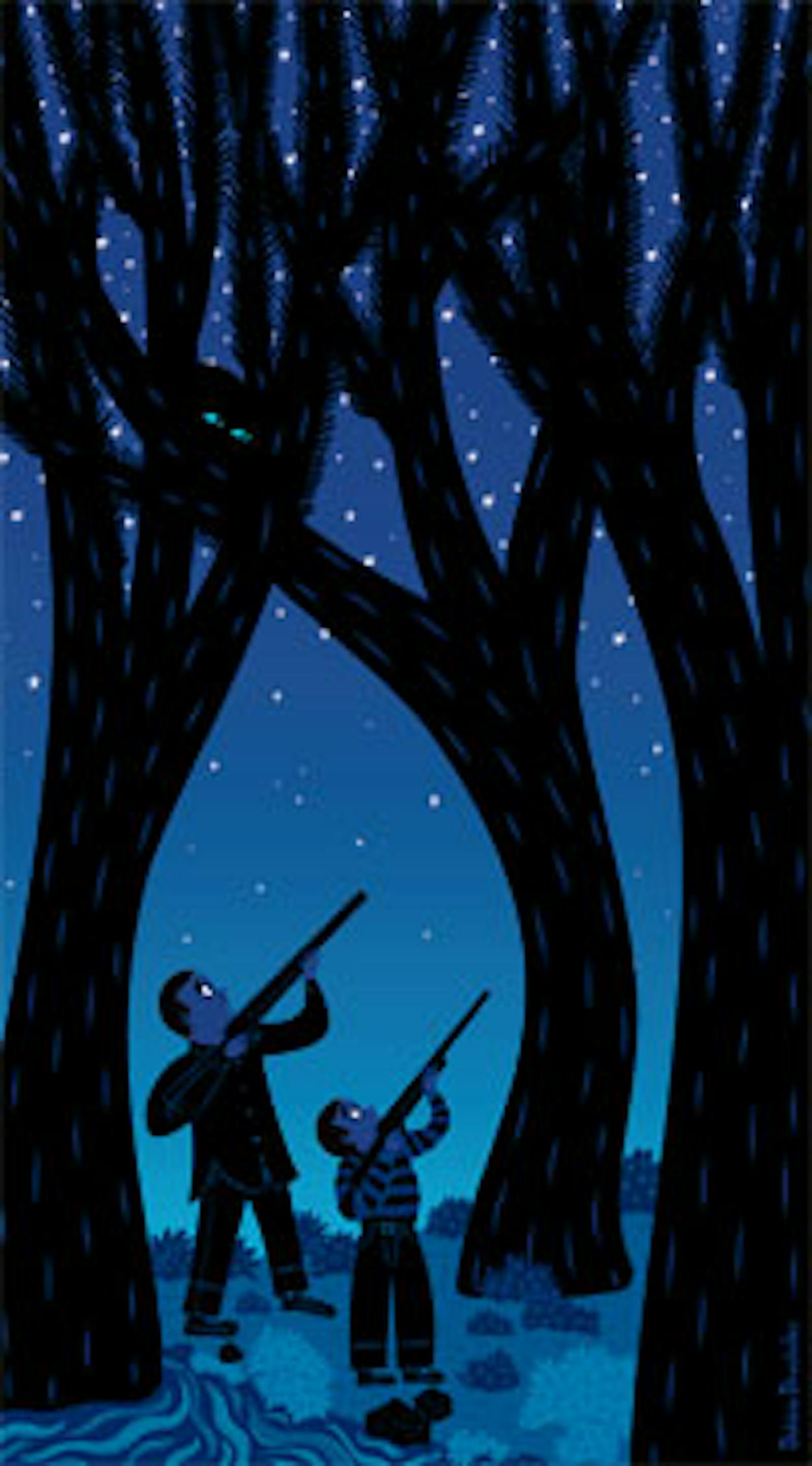SINCE I’VE FORGOTTEN THE FIRST half of my life, it’s rather difficult for me to remember my childhood, but I do recall going hunting at the wise old age of seven for the first and last time. One night my four-year-old brother, Roger, and I went coon hunting near Medina with our neighbor Cabbie. Cabbie had an old coon dog named Rip, and Roger suggested that I kiss the dog on the nose. It was the last time in my life I ever took advice from anyone who is younger than I am. Rip bit me ferociously on my nose, causing excessive bleeding and even more excessive tears.
Eventually the hunt proceeded with Cabbie navigating his Jeep down by a stream under a canopy of beautiful cypress trees. It was a dark, moonless night, and Cabbie told us to look up at the tops of the trees and squeeze the trigger when we saw a pair of eyes. This seemingly simple suggestion was complicated somewhat by the fact that God had chosen that night to envelop the Hill Country in a majestic cathedral sky from which stars peripatetically peeped out through the branches at little children, making it impossible to determine whether you were shooting a raccoon or a star. In the end my brother and I each killed a young ringtail, an animal officially recognized as a varmint by the county. We collected a bounty of $1.50 apiece. We did not inquire back then, nor did the county ever tell us, what bounty they might have offered for killing a star.
Now, you might be asking yourself, “Why is this man sifting through the ashes of his childhood for a poignant hunting story now that hunting season is over?” The answer is that hunting season is never really over, nor, apparently, is this column. Deer season may have ended, but that does not mean any of us are safe from an errant bullet fired by an errant bullethead. It only means that hunters have turned their cold sights from harmless Bambies and creatures that fly higher than their dreams to other prey. There is never a moment when a Texan cannot legally curl his finger ’round a happy trigger. Seasons have been decreed for white-tailed deer, mule deer, pronghorn antelope, alligator, dove, turkey, rabbit, javelina, quail, pheasant, squirrel, and yes, Virginia, that most fearsome of all predators in the wild, the lesser prairie chicken.
Today, however, I do not suffer hunters gladly. I realize, of course, that in a deeper sense all of us are hunting for something, and few of us ever find it. If we do, we often find ourselves killing the thing we love. As Oscar Wilde once so aptly described fox hunting: “The unspeakable in full pursuit of the uneatable.” And yet it goes on and on. Dressed in camouflage, the great white hunters sit in family restaurants, shiver in deer blinds, and swap stories sometimes proud, sometimes wistful for the one that got away. As blameless as bullfighters and butterfly collectors, these men for all seasons continue to wage a one-sided war against creation. They hunt only, they say, to cull the vast deer population. They hunt only to teach kids how to hunt. These are the good reasons they give, but they are not necessarily the real reasons. The truth is a much more difficult animal to track. As an honest old redneck once told me about deer: “I just like to put the brakes on ’em.”
Yet ours is not the only culture lacking enough culture not to practice such practices. In my own Peace Corps experience in Borneo, I lived for a time among a nomadic tribe of pygmies known as the Punan. One of the delicacies of the Punan is monkey brains, which I ate on a number of occasions. Monkey brains, perhaps not surprisingly, taste quite similar to lesser prairie chicken. The Punan use blowpipes to kill their game, but these seemingly primitive little people are not without their own values of sportsmanship. They do not shoot an animal until it has seen them coming, which gives their prey a fighting chance to flee. This is a foreign concept to those more-civilized Texans who hunt elk from a helicopter.
Fortunately only about 4 percent of all Texans are licensed hunters. This means that 96 percent of us are relegated to the unhappy status of moving targets. Once the hunters shoot the donkey in the farmer’s field, they’ll shoot our asses next. A great writer named Anonymous once wrote: “The larger the prey, the more corrupt is the soul of the hunter.” This may help explain why so many big-game hunters suffer from erectile dysfunction and run the risk of ending up like Ernest Hemingway, who eventually bagged the biggest game of all, himself. If you live in the Hill Country, however, you’re probably just proud to have survived another hunting season without getting your head blown off. This does not necessarily guarantee, of course, that you won’t be shot in the buttocks by some bow-hunting nerd like Ted Nugent.
- More About:
- Politics & Policy
- Hunting







